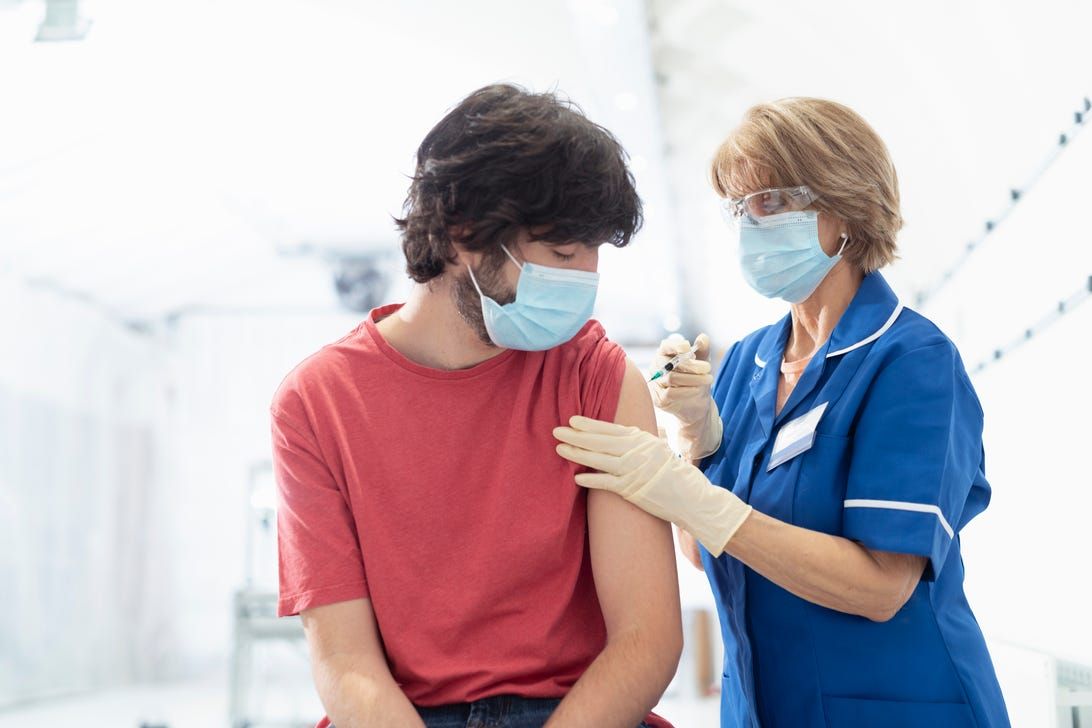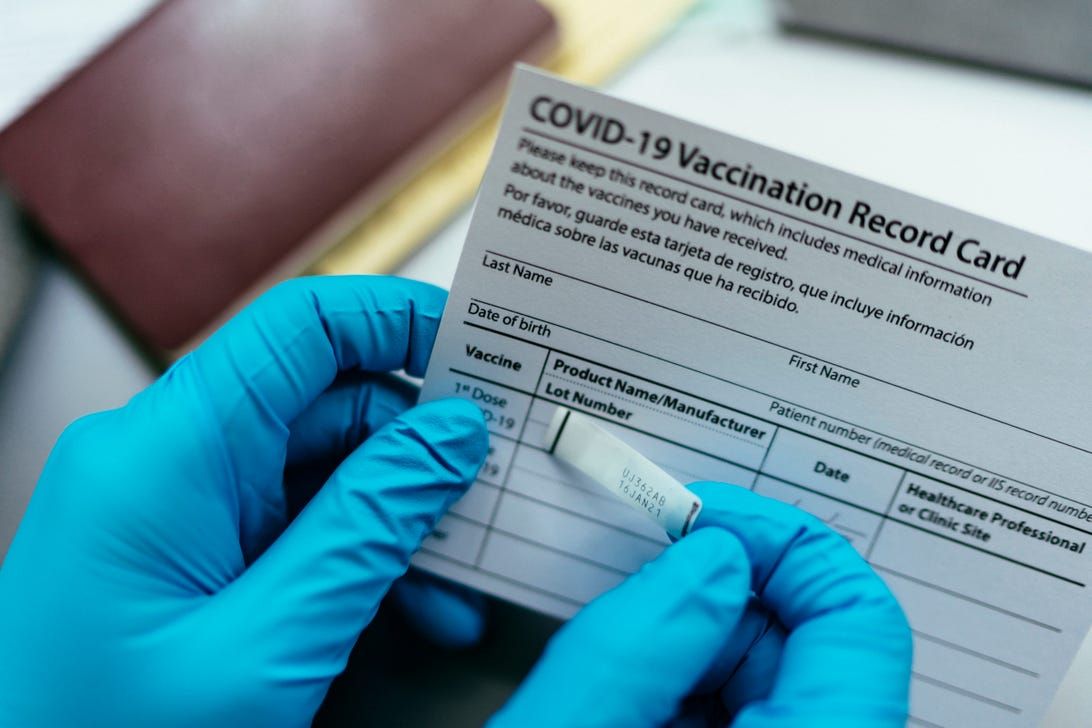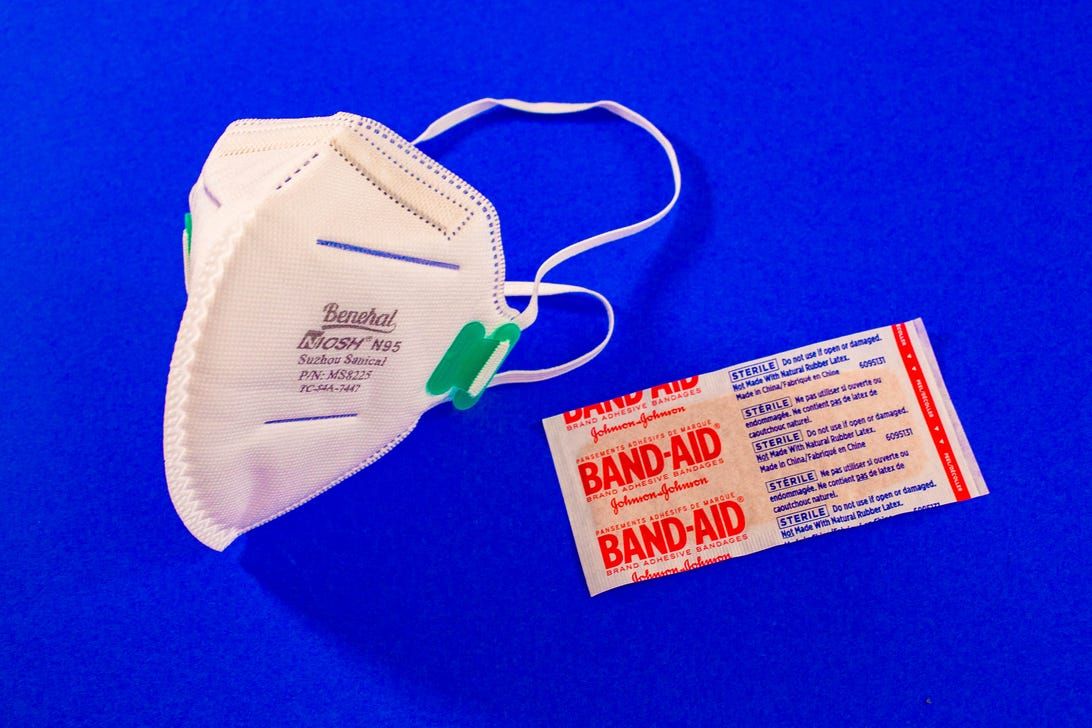
Data on fourth COVID shots are limited due to the low number who've received them.
Monty RakusenThe chances for a fourth dose of the mRNA COVID-19 vaccines increased this week as both Pfizer and Moderna requested that the US Food and Drug Administration authorize second booster shots of their BioNTech and Spikevax vaccines. Pfizer requested approval for adults 65 and older, while Moderna asked the FDA to allow the fourth shot for all adults.
Last week on CBS's Face the Nation, Pfizer CEO Albert Bourla said that another course of the vaccine is "necessary" to keep infections at bay. Bourla said the third shot that is available now to Americans 12 and older "is good enough, actually quite good for [preventing] hospitalizations and deaths." But it doesn't last very long and "it's not that good against infections."
On Wednesday, a new study from the New England Journal of Medicine offered mixed results on the efficacy of a second booster shot. Based on 1,050 Israelis who've received a fourth dose, research showed that antibody levels increased but protection against infection was minimal. The study estimated only 30% protection from infection with a second booster from Pfizer, and 11% protection from a second Moderna booster.
Read on to learn what we know about a fourth booster shot, including when it could be approved, who would take it and whether it would be effective on different variants.
For more, learn everything we know about long COVID, which states still have school mask mandates and why the CDC is now saying a two-month interval between initial mRNA vaccine shots could be optimal.
When will the government approve a fourth COVID-19 booster?
Numerous studies indicate the effectiveness of COVID-19 vaccines decreases over time, and US health officials continue to move toward recommending a second booster shot for the general population.
"The potential future requirement for an additional boost -- a fourth shot for mRNA, or a third shot for Johnson & Johnson -- is being very carefully monitored in real time," White House Chief Medical Adviser Dr. Anthony Fauci said in a February press briefing.
The FDA is potentially preparing to authorize a fourth vaccine dose in fall 2022, according to The Wall Street Journal.
Health officials in Israel, Germany, the UK, Sweden and other countries already recommend a fourth booster for individuals with certain conditions or of a certain age.
Bourla added that any strategy on additional shots needs to be carefully coordinated with the FDA and the CDC "so that we are all providing to the American people and to the world a cohesive picture rather than confusion."
Who is eligible for a fourth shot right now in the US?
The Centers for Disease Control and Prevention in October approved a fourth shot of an mRNA vaccine, like Pfizer's or Moderna's, for individuals who are immunocompromised or have other specific health issues. The shot, a third primary shot rather than a booster, should be delivered at least 28 days after their most recent dose.
Five months after that third primary shot, vulnerable people are eligible for a fourth shot.
Categories that the CDC considers "moderately or severely immunocompromised" include:
- •Patients in active cancer treatment for tumors or blood cancers
- •Those with organ transplants who take medicine to suppress the immune system
- •Those who've received a stem cell transplant within the last two years
- •People with moderate or severe immunodeficiency (such as DiGeorge syndrome, Wiskott-Aldrich syndrome)
- •People with serious HIV infection
- •Patients taking medicine or drugs that may suppress their immune response
Immunocompromised people have reported seeking fourth shots but being turned away by some pharmacies. Kaiser Health News reported the CDC spoke with major pharmacy chains to ensure they are aware of the eligibility of some Americans to receive their fourth shot.
According to the CDC's recommendations, patients do not need to show proof that they are immunocompromised.
How long do COVID-19 vaccines remain effective?
Messenger RNA vaccines, like the ones offered by Pfizer and Moderna, offer good protection against serious COVID-19 complications -- especially after a booster -- but their potency wanes over time.
In a February warning, the US Centers for Disease Control and Prevention reported that protection against hospitalization from mRNA vaccines dropped noticeably after just four months, even with a booster: When the delta variant was predominant, protection against hospitalization was 96% within two months of a third mRNA shot, but sank to 76% within four months.
During the omicron variant wave, protection from hospitalization fell from 91% within two months of an mRNA booster to 78% after four months.

Three shots of an mRNA vaccine provided 87% protection against an ER visit within the two months, but fell to 66% after four months, and 31% after nine.
Getty ImagesA February metastudy in The Lancet determined that mRNA vaccines, like Pfizer's and Moderna's, decreased in their ability to fight off infection by from 20% to 30% six months after a third shot.
Their protection against "severe" disease and hospitalization remained high in the same time frame, however.
For symptomatic COVID-19 disease, vaccine effectiveness decreased by roughly 25% across the board at the six-month mark, and by 32% in people age 50 and older.
A CDC study found vaccines' protection against hospitalization when omicron was dominant dropped from a high of 91% within two months of a booster to 78% after four months.
Protection from an ER visit slipped from 87% within two months of a booster to just 66% after four or five months. After another five months, it plummeted to just 31% protection against an ER or urgent-care encounter.
Without a third booster, Pfizer/BioNTech's vaccine, Comirnaty, was 88% effective in preventing infection several weeks after the second dose, but only 47% six months later, according to an October 2021 Lancet article, Reuters reported. Its ability to fend off hospitalization and death remained high, about 90%, in the same time period.
What has Pfizer said about a fourth booster shot to protect against COVID-19?
Bourla told CNBC's Squawk Box that "it's clear" that "in an environment of omicron to boost the immune response" another booster shot is needed.
"There are vaccines like polio [where] one dose is enough," Bourla said back in 2021. "And there are vaccines, like flu, that you need every year. The COVID-19 virus looks more like the influenza virus than the poliovirus."
Executives said the company is experimenting with an omicron-specific version of the vaccine and also looking at a multivariate vaccine that could protect against a variety of strains, such as the original alpha variant and more virulent delta strain.
What has Moderna said about a fourth shot?
Like Pfizer, Moderna has asked the FDA to amend the emergency use authorization of its Spikevax vaccine to include a fourth dose. While Pfizer has asked for approval for use by people 65 and older, Moderna wants a second booster of the vaccine for all adults.
In an interview with Business Insider on Monday, Moderna President Stephen Hoge said that a fourth dose is probably only necessary for people who are older or immunocompromised and that others could make their own choice. Hoge said, "Is it necessary? I think that's a strong word. I think it will provide a benefit to anyone who gets it," adding that he will choose to get a yearly booster due to the risk of long COVID.
The current Spikevax booster is a 50-microgram dose, half of the original dose. While the company has also reported a 100-microgram booster of Spikevax has proven exponentially effective against omicron, it does not plan to seek approval from the FDA for the double-dose booster.
Moderna is working on an omicron-specific booster, but Nature reports that variant-specific vaccines have not shown much promise of working any better than the original COVID mRNA vaccines.
What has Johnson & Johnson said about another shot?
A study of 69,000 health care workers released in December by the South African Medical Research Council found that, for those who already received the one-shot J&J vaccine, a booster given six to nine months later raised the odds against hospitalization from 63% to 85%.
The research was conducted between mid-November and mid-December 2021, when the omicron variant represented 98% of all confirmed COVID-19 cases in South Africa, suggesting the vaccine offers strong protection against the highly contagious strain.
More on COVID-19
"This adds to our growing body of evidence which shows that the effectiveness of the Johnson & Johnson COVID-19 vaccine remains strong and stable over time, including against circulating variants such as omicron and delta," Mathai Mammen, global head of Janssen Research & Development, a pharmaceutical subsidiary of Johnson & Johnson, said in a statement.
What's the status of a multivalent vaccine that is effective against different COVID-19 strains?
Bourla told CNBC that Pfizer is working on a vaccine "that covers omicron and all the other variants."
He said, "There are so [many] trials that are going right now, and a lot of them we'll start reading by the end of the month."
Moderna President Stephen Hoge said in December his company was also working on a multivalent vaccine that would tackle include up to four different variants, including omicron.
The authorization process, he told Reuters, could take at least three or four months, if not longer.
Unless the FDA changed its regulatory process, "omicron-specific boosters, just realistically, are not [going to be available] before March and maybe more in the second quarter," Hoge said.
The information contained in this article is for educational and informational purposes only and is not intended as health or medical advice. Always consult a physician or other qualified health provider regarding any questions you may have about a medical condition or health objectives.

Pfizer and BioNTech submitted data to the US Food and Drug Administration for an additional COVID-19 booster dose in adults age 65 and older, the companies said Tuesday.
If the FDA authorizes Pfizer's request and it is recommended by the US Centers for Disease Control and Prevention, older adults would be able to get another booster regardless of which COVID-19 vaccine they received for their first booster shot.
Pfizer and BioNTech said their submission is based on real-world data from Israel when the omicron variant was circulating. COVID-19 infections were two times lower and rates of severe illness were four times lower in people age 60 and up in Israel who received an extra shot of Pfizer at least four months after the third dose, compared with people the same age who received only one booster, or three shots total, the companies said.
Results from another study found that the antibody response in adults age 18 and up who received a fourth dose had a significantly higher antibody response in the weeks that followed their fourth dose, according to the companies.
Older age is one of the biggest risk factors that increases someone's risk for getting severely ill with COVID-19. Research also shows that older age groups are likely to benefit most from COVID-19 boosters.
While the COVID-19 vaccines maintain good protection against severe disease and death, booster shots have been encouraged as the omicron variant became dominant worldwide and has evaded some immune protection.
Pfizer CEO Dr. Albert Bourla said this week that fourth shots are "necessary." Some scientists have questioned the push for additional boosters of vaccines created for earlier variants for the whole population (everyone 12 and up in the US is eligible) and have encouraged other solutions like further development of pan-coronavirus vaccines that could work against all variants.




